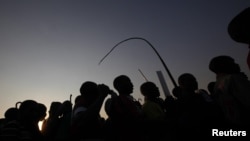JOHANNESBURG — A top South African official says a court has provisionally dropped murder charges against 270 miners charged under an little-used law, after police shot dead 34 of their colleagues.
South Africa’s decision to charge 270 striking miners with murder prompted a storm of criticism.
The charge was prompted by a “common purpose” clause used often in the apartheid era against black activists. It basically accused the illegal strikers of setting the scene for their colleagues’ deaths.
The charges prompted Justice Minister Jeff Radebe to demand an explanation from prosecutors. He said the charges had “induced a sense of shock, panic and confusion within the members of the community and the general South African public.”
Police said they shot and killed the 34 protesters in self-defense after being shot at first. No police were killed in the August 16 clash and none have been charged as a government investigation continues.
National Prosecuting Authority spokeswoman Bulelwa Makeke says acting national director of prosecutions Nomgcobo Jiba decided it was best to wait for investigations to conclude before pursuing murder charges. But she did not remove lesser charges against the miners.
“What it means is, it is not saying those charges are completely lost, it means that because of the seriousness of the charges, they actually need to be brought on against more evidence, which will come out of the commission of inquiry and other criminal investigations," she said.
Makeke said the decision was predominantly legal, not political. “There is absolutely nothing in the mandate of the NPA that requires it to take into account political considerations. What it must take into account is really information that is before it and then act in terms of the powers that it has," she said.
The miners had held a wildcat strike, after union negotiations broke down. They had gathered for several days outside the mine. Before the shootout erupted, eight protesters and two policemen had been killed in previous days.
The common-purpose law was used during the apartheid era against black activists, most famously with the so-called “Upington 14” who were sentenced to death for the crowd killing of a policeman in 1985, even though the judge acknowledged that they did not commit the act itself.




